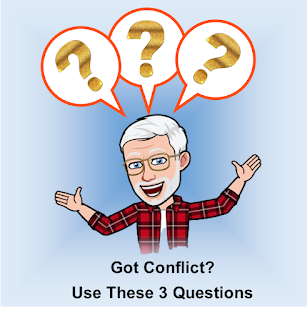Stuck in Conflict? "Good Enough" Can Be Your Key to a Resolution
Stuck in Conflict?
"Good Enough" Can Be Your Key to a Resolution
 "Perfection is the enemy of the good." - Voltaire
"Perfection is the enemy of the good." - Voltaire
Are you stuck in a conflict that seems impossible to resolve?
Are people clinging to the idea of a perfect solution? This post explores how "good enough" agreements can help resolve conflicts that lead to a lasting resolution.
It's more than just a balanced compromise where both sides give up some things to reach a fair agreement. It's about setting the right expectations from the beginning.
An example. Imagine two neighbors arguing over a fence. One neighbor is upset about stray dogs and thinks a fair solution is to tear out the old fence and build an entirely new, chain-link fence tall enough to exclude dogs. The other neighbor likes the existing fence because it is an attractive combination of low fencing and tall vegetation plantings. They might think a fair solution is to keep the existing fence by retrofitting solutions that will help exclude dogs. If they never discuss what "fair" means to each other, they'll both walk away from the conversation frustrated. And they will walk away without doing any work to discover a new, creative solution that can work for both.
How to work with “good enough.” In my experience mediating conflicts, I have discovered that if the conversation doesn't address what decision-making standard is appropriate, both parties will likely create their own definition of what constitutes an acceptable solution. Unsurprisingly, this usually means they'll be looking for a perfect solution that completely satisfies them, with little regard for the other person's needs.Having the parties discuss and come to an understanding about using a "good enough" decision-making standard acknowledges reality. It recognizes that perfect solutions are rare, and instead focuses on finding a decision that's "good enough for now and safe enough to try." The goal is for the parties to move forward together with a solution that is "serviceable" even if it's not perfect. This allows everyone to put the current conflict behind them and begin working toward a future together.
The example re-visited; the benefits of “good enough.” Let's go back to the fence example. A "good enough" solution might involve repairing the existing fence and splitting the cost but designing the repairs with upgrades to meet each party’s needs—maintain attractiveness and exclude dogs. This might not be ideal for either neighbor, but it's a fair compromise that allows them to move forward by getting enough of a solution so they can live peacefully with each other (which is a new objective that emerges in the conversation). Additionally, if the parties remain worried about the compromise decision not working, they can include a "review and adjustment clause" in their agreement. This clause allows them to revisit the fence issue in the future if, for example, the repairs don't work out as hoped.
Simple skills anyone can use are:
Explaining the benefits: "Good enough" saves time, money, emotional stress, and preserves the relationship that the parties will need in the future.
Exploring underlying interests: Finding common ground is
easier when people in conflict focus on what truly matters—for example,
preserving neighborly relationships while managing dogs and the attractiveness of
the fence.
Brainstorming options: There
might be more solutions than you think! There often is a “third way” to resolve
a conflict if sufficient creativity is added to the conversation.
Providing reality checks:
Considering the downsides of not reaching an agreement can help. In short, you
are asking the parties, in diplomatic terms, if continuing their fight is the
best option.
Coaching negotiation techniques:
People often need to learn how to make effective compromises. When you approach
a conflict by taking an inflexible position you cut off creative thinking about
new possibilities (a “third way”) that can work.
Free Consultation - Just Ask!
I offer free consultations on conflict, facilitation, difficult meetings, public involvement, online meetings, and collaboration in general. Schedule an opportunity to talk with me about your issue. I promise to not trap you into a marketing message. We will stick to problem-solving on your issue. Click for Appointment
Contact Me:
Michael Fraidenburg
Olympia, WA, USA.
Email Mike
© 2024, Michael E. Fraidenburg. All rights reserved.






